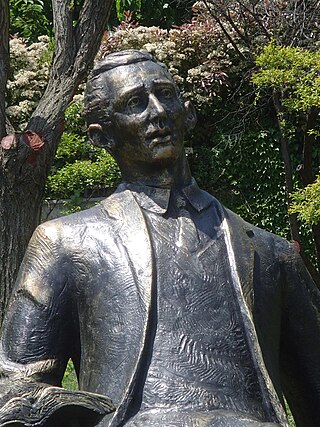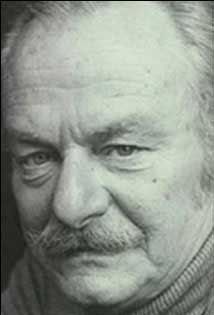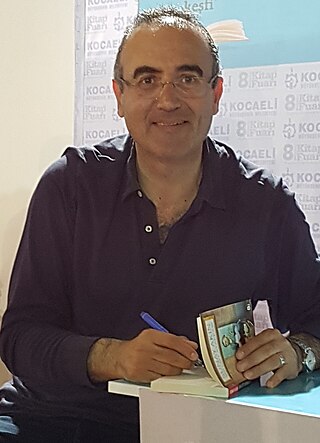
Ferit Orhan Pamuk is a Turkish novelist, screenwriter, academic, and recipient of the 2006 Nobel Prize in Literature. One of Turkey's most prominent novelists, his work has sold over thirteen million books in sixty-three languages, making him the country's best-selling writer.
The culture of Turkey combines a heavily diverse and heterogeneous set of elements that have been derived from the various cultures of the Eastern European, Eastern Mediterranean, Caucasian, Middle East and Central Asian traditions. Many of these traditions were initially brought together by the Ottoman Empire, a multi-ethnic and multi-religious state spanning across Central Europe, Eastern Europe, the Middle East and North Africa.
Turkish literature comprises oral compositions and written texts in the Turkish language. The Ottoman form of Turkish, which forms the basis of much of the written corpus, was highly influenced by Persian and Arabic literature, and used the Ottoman Turkish alphabet.

Orhan Veli Kanık or Orhan Veli was a Turkish poet. Kanık is one of the founders of the Garip Movement together with Oktay Rıfat and Melih Cevdet. Aiming to fundamentally transform traditional form in Turkish poetry, he introduced colloquialisms into the poetic language. Besides his poetry Kanık crammed an impressive volume of works including essays, articles and translations into 36 short years.

Cemâl Süreya was a Turkish poet and writer of Kurdish–Zaza descent.
Prose of the Republic of Turkey covers the "Turkish Prose" beginning with 1911 with the national literature movement.
Varlık is a monthly Turkish literature and art magazine. Established by Yaşar Nabi Nayır, Sabri Esat Siyavuşgil, and Nahit Sırrı Örik in 1933, it often publishes poetry and works of famous Turkish poets and writers.
Orhan Kemal is the pen name of Turkish novelist Mehmet Raşit Öğütçü. He is known for his realist novels that describe the life of the poor in Turkey.
There were a number of poetic trends in the poetry of Turkey in the early years of the Republic of Turkey. Authors such as Ahmed Hâşim and Yahyâ Kemâl Beyatlı (1884–1958) continued to write important formal verse whose language was, to a great extent, a continuation of the late Ottoman tradition. By far the majority of the poetry of the time, however, was in the tradition of the folk-inspired "syllabist" movement, which had emerged from the National Literature movement and which tended to express patriotic themes couched in the syllabic meter associated with Turkish folk poetry.
Ali Oktay Rifat, better known as Oktay Rifat, was a Turkish writer and playwright, and one of the forefront poets of modern Turkish poetry since the late 1930s. He was the founder of the Garip movement, together with Orhan Veli and Melih Cevdet.

Melih Cevdet Anday was a Turkish writer whose poetry stands outside the traditional literary movements. He also wrote in many other genres which, over six and a half decades, included eleven collections of poems, eight plays, eight novels, fifteen collections of essays, several of which won major literary awards. He also translated several books from diverse languages into Turkish.

Sunay Akın is a Turkish poet, writer, TV host, journalist, and a philanthropist. He is the founder of Istanbul Toy Museum.
The time that can be called contemporary in Turkish literature falls in the period between the middle of the 20th century and the first years of the new millennium. Throughout this period many changes in literary discourse have occurred. Together with the fall of the Ottoman Empire and foundation of the Turkish Republic brought a different way to Turkish literature together with the effect of Westernization on Turkish writers. The literature of the new republic emerged largely from the pre-independence National Literature movement, with its roots simultaneously in the Turkish folk tradition and in the Western notion of progress. One important change to Turkish literature was enacted in 1928, when Mustafa Kemal initiated the creation and dissemination of a modified version of the Latin alphabet to replace the Arabic-based Ottoman script. Over time, this change—together with changes in Turkey's system of education— would lead to more widespread literacy in the country. In 1950s, Turkish authors started to write in the tone of their western contemporaries bringing a new sense of literature to the country.

Ümit Yaşar Oğuzcan was a Turkish poet.
Erol Güney was a Turkish-Israeli journalist, translator and author. He is known for translating Western classics into Turkish in the 1940s, including those of Fyodor Dostoyevsky, Anton Chekhov and Molière. He was deported from Turkey in the 1950s due to an article that he wrote about the Soviet Union and emigrated to Israel in 1956, where he lived until his death in 2009.
Pembe Marmara was a Turkish Cypriot poet. She was one of the most important Turkish Cypriot poets of the 1940s and one of the earliest female Turkish Cypriot poets. Her poetry was influenced heavily by the Garip movement in Turkey and she wrote works of satire in free verse. Her poetry is also distinct from the nationalism characterising Turkish Cypriot poetry of her time, instead focusing more on the experience of being a Turkish Cypriot.

Efe Murad is a Turkish poet, translator, and historian.
Yusuf Ziya Ortaç was a Turkish poet, writer, literature teacher, publisher and politician.
Ülkü Tamer, was a Turkish poet, journalist, actor and translator.






